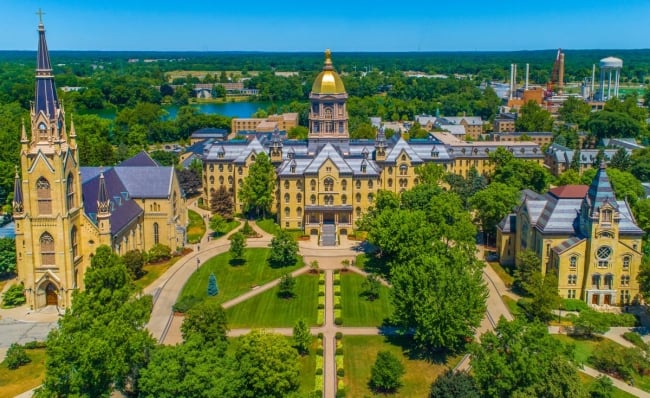You have /5 articles left.
Sign up for a free account or log in.

The University of Notre Dame
iStock.com/Aaron Yoder
In the past few weeks, visions of the coming fall semester on college campuses have become increasingly divergent. A few weeks ago, several institutions announced their intention to reopen in the fall. Last week, California State University campuses became some of the first major American universities to say a majority of instruction in the fall likely will be online.
Now, several universities have tried to split the difference, saying they will begin the fall in person but make a shift at Thanksgiving break.
Some, such as the University of South Carolina and Regis University, have said they will continue with remote instruction or assessment after the holiday. Others, such as the University of Notre Dame and Creighton University, have said they will instead begin the term a bit earlier in August and end it at the break in late November. Many of them have canceled a fall break that usually occurs in mid-October, to prevent students from traveling and returning to campus en masse.
The idea behind the switch at Thanksgiving is to avoid a second wave of the outbreak late in the term, which some scientists have forecast.
"With this plan, if a second surge occurs around Thanksgiving, your child will already be safely at home," Regis officials wrote in a message to parents.
But epidemiological models can be messy. An influential set of forecasts from scientists at the University of Minnesota predicts a much more severe second wave in the late fall in one of its scenarios. But a different scenario from the same scientists predicts the wave to be smaller but earlier in the year.
Universities also are at the mercy of elected officials in their states, who have the power to override decisions from a college administration.
Paul Browne, vice president of public affairs at Notre Dame, said that while the administration is confident in its plan, it is prepared to shift to distance learning or begin the semester online if public health considerations make that necessary. Faculty members also have been asked to prepare their courses in two distinct modules, to provide some flexibility in the case one must be delayed.
Janet Houser, provost of Regis University in Denver, said the campus is planning for multiple contingencies and levels of risk, such as having only two to nine students in a classroom, with the rest participating simultaneously over Zoom. Sixty percent of courses at Regis already are online, and 38 percent of students learn exclusively online.
But she emphasized that Colorado is mostly rural, and forecasts from public health officials predict few cases in the state by August.
"The plan we have may not work for others in the country," she said. "Colorado took action very quickly and very early. We've for two weeks now been out of the stay-at-home order."
Colleges have been under pressure to reopen campuses, from elected officials who want to reboot the economy as well as students and families. Many prospective students are wary of committing to a college if instruction is online, and current students have pushed their administrations for answers.
"What we heard overwhelmingly was that [students] really missed the campus experience, the college experience," Houser said. "Since Jesuit education prides itself on being both formative and educational, we took that very seriously."
Houser also said families needed to make plans for the semester.
"I had an awful lot of parents saying, 'Look, we need to make some plans. If our student is going to need to be moved into the residence halls a week early, we need to know that now to make travel plans.'"
Timothy White, chancellor of the California State University system, who announced an online fall for those campuses, said the idea of a Thanksgiving switch to online or something similar did come up in his planning conversations, but it was abandoned.
"We didn't think we had the clairvoyance to know exactly when that second wave was going to come," he said. Altering the calendar could still end up missing the mark with spikes in the virus, he said. Plus, coordinating a policy for 23 campuses that already start on different days would be too complicated.
Regis and Notre Dame are both planning to accommodate students who cannot take classes in person because they are vulnerable to COVID-19.
Some have questioned whether faculty members, who are more likely than their students to be of advanced age, will want to return to campus in the fall if their campuses open. Some colleges that have said they will be in person, such as William Jewell College in Missouri, have said faculty will have the option of teaching remotely if they feel uncomfortable.
Browne, at Notre Dame, said faculty who are sick will be accommodated, and that grad students or other professors may be able to step in.
At Regis, Houser said no decisions have been solidified yet about faculty involvement, but administrators are brainstorming solutions, such as having faculty volunteers to take on in-person classes, while others continue teaching online.
She said this spring, when students were forced to learn online, they reported that their learning continued despite obstacles. But what students really missed was campus life.
"We're trying to get our students the maximum college experience because that's what we've heard they're losing out on," said Houser. "Their parents want them to have a campus experience. They don't want them in their basement for the rest of the year."




